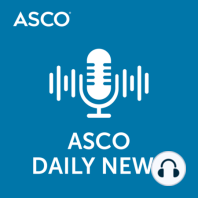12 min listen
Utilizing Advanced Practice Providers to Their Full Scope in Oncology
FromASCO Daily News
ratings:
Length:
19 minutes
Released:
Feb 17, 2022
Format:
Podcast episode
Description
Host, Dr. John Sweetenham, associate director of Clinical Affairs at UT Southwestern Harold C. Simmons Comprehensive Cancer Center, and Dr. Sandra Kurtin, director of Advanced Practice and Clinical Integration at the University of Arizona Cancer Center, discuss the future importance of advanced practice providers to the oncology workforce and how to enhance their role in cancer research. Transcript: Dr. John Sweetenham: Hello. I'm John Sweetenham, the associate director of Clinical Affairs at UT Southwestern's Harold C. Simmons Comprehensive Cancer Center, and host of the ASCO Daily News podcast. Today we'll be discussing the role of advanced practice providers in oncology and their future importance to the oncology workforce. I'm delighted to welcome our guest, who's a former colleague of mine, Dr. Sandra (Sandy) Kurtin, the director of Advanced Practice and Clinical Integration and an assistant professor of Clinical Medicine at the University of Arizona Cancer Center. Dr. Kurtin is also the president and founding board member of the Advanced Practitioner Society for Hematology and Oncology and an associate editor for the American Society of Hematology News. Sandy, it's great to renew our acquaintance and to have you on the podcast today. Dr. Sandy Kurtin: Thank you, and I'm delighted to be here. Dr. John Sweetenham: Before we start, I should mention that my guest and I have no conflicts of interest relating to our topic today. Full disclosures of all guests on the podcast are available on our transcripts, asco.org/podcasts. So Sandy, workforce shortages have been a concern in oncology for some time now and there has been a concern expressed in the literature and especially by ASCO probably for more than 5 years now--suggesting that the oncology workforce, or at least the physician workforce, is diminishing and we really need to be looking at new opportunities in terms of who comprises the workforce in the future. In addition to a growing and aging population in the United States and an increasing incidence of cancer, we also see new and emerging therapies and technologies which increase the number of cancer survivors. So, it seems more important than ever that we utilize all of our oncology workforce, and particularly advanced practice providers (APPs) to therefore scope in oncology. Based on the assumption that we would expect much of that APP practice in the future to be independent practice, what do you think, Sandy, of the cancer services where APP led services can offer the best opportunity? Dr. Sandy Kurtin: I think that one of the really remarkable things that I've come to realize—I've been doing this for 37 years—is that we do have not only a growing cancer population, but we have a population of patients that are living much longer, thankfully, with their cancer, and as a result, become more and more complicated patients that require much more specific and complex care, and it really does take a full team. And so, I think using everyone to the full scope of their licensure is really critical to maximize any team. This takes a team. So, using the word ‘independent,’ I think of that we are always collaborative as members of the interdisciplinary multidisciplinary team, but we can exceed and take the lead in a number of areas that I think are really critical given that population of patients. One of those things are symptom management clinics. I know we, in our practice, are part of the Oncology Care Model (OCM) initiative and we know that keeping people out of the ER and the urgent care settings, out of the hospital, is really critical for any practice and for patients. And so, running symptom management clinics, same day outpatient clinics, having that same agility in an inpatient APP-supported practice is really important. There's been a lot of work overtime in survivorship clinics and continuity clinics overseeing infusion services. I know in our practice
Released:
Feb 17, 2022
Format:
Podcast episode
Titles in the series (100)
Hot Topics and Abstract Highlights From #GI22: Guest host, Dr. Muhammad Shaalan Beg, director for Gastrointestinal Medical Oncology at UT Southwestern's Harold C. Simmons Comprehensive Cancer Center and Dr. Manisha Palta, radiation oncologist at the Duke University Health System in North Carolina... by ASCO Daily News
